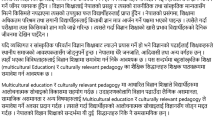Abstract
This review explores Meyers and Crawford’s “Teaching science as a cultural way of knowing: Merging authentic inquiry, nature of science, and multicultural strategies” by examining how they combine the use of inquiry-based science instruction with multicultural strategies. In this conversation, I point to the need of specific discourse strategies to help teachers and students create hybrid spaces to push the boundaries of cultural congruence as described in this article. These strategies include a reflective component to the explicit instruction that encourages an integration of home and science discourses. My response to this work expands on their use of multicultural strategies to push toward a congruent Third space that asks not only what happens to the students who do not participate in science, but also what happens to science when a diverse group of people does not participate?

Similar content being viewed by others
References
Akindehin, F. (1988). Effect of an instructional package on preservice science teachers’ understanding of the nature of science and acquisition of science-related attitudes. Science Education, 72, 73–82.
Brown, B. A. (2004). Discursive identity: Assimilation into the culture of science and its implications for minority students. Journal of Research and Science Teaching, 41, 810–834.
Brown, B. A. (2006). “It isn’t no slang that can be said about this stuff”: Language, identity, and appropriating science discourse. Journal of Research and Science Teaching, 43, 96–126.
Erickson, F. (1993/1996). Transformation and school success: The politics of cultural educational achievement. In E. Jacobs & C. Jordan (Eds.), Minority education: Anthropological perspectives (pp. 27–51). Norwood, NJ: Ablex Publishing Coroporation.
Gee, J. P. (1996). Social linguistics and literacies: Ideology in discourses (2nd ed.). London: Falmer Press.
Gonzalez, N., Moll, L., & Amanti, C. (Eds.). (2005). Funds of knowledge: Theorizing practices in households, communities, and classrooms. Mahwah, NJ: Routledge.
Gutiérrez, K. (2008). Developing a sociocritical literacy in the third space. International Reading Association, 43, 148–164.
Lugones, M. (1987). Playfullness, “world”-travelling, and loving perception. Hypatia, 2(2), 3–19.
Meyer & Crawford (2011) Teaching science as a cultural way of knowing: Merging authentic inquiry, nature of science, and multicultural strategies. Cultural Studies of Science Education. doi: 10.1007/s11422-011-9318-6.
Moje, E. B., & Hinchman, K. (2004). Culturally response practices for youth literacy learning. In T. L. Jetton & J. A. Dole (Eds.), Adolescent literacy research and practice. New York: Guilford Press.
Moje, E. B., Tehani, C., Carrillo, R., & Marx, R. W. (2001). Maestro, what is ‘quality’?: Language, literacy, and discourse in project-based science. Journal of Research in Science Teaching, 38, 469–498.
Moll, L. C. (1992). Bilingual classroom studies and community analysis: Some recent trends. Educational Researcher, 2, 20–24.
National Research Council. (1996). National science education standards. Washington, DC: National Academy Press.
Velez-Ibanez, C. G. (1988). Networks of exchange among mexicans in the US and mexico: Local level mediating responses to national and international transformations. Urban Anthropology, 17(1), 27–51.
Walls, L. (2009). Awakening a dialog: Examining gender and race in NOS studies from 1967 to 2008. Paper presented at the National Association of Research in Science Teaching (NARST), Orange County, CA.
Author information
Authors and Affiliations
Corresponding author
Additional information
Forum response to Meyers and Crawford (2011). Teaching science as a cultural way of knowing: Merging authentic inquiry, nature of science, and multicultural strategies.
Rights and permissions
About this article
Cite this article
Quigley, C. Pushing the boundaries of cultural congruence pedagogy in science education towards a third space. Cult Stud of Sci Educ 6, 549–557 (2011). https://doi.org/10.1007/s11422-011-9335-5
Received:
Accepted:
Published:
Issue Date:
DOI: https://doi.org/10.1007/s11422-011-9335-5




